国际贸易实务双语Chapter 2
- 格式:pptx
- 大小:1.27 MB
- 文档页数:42
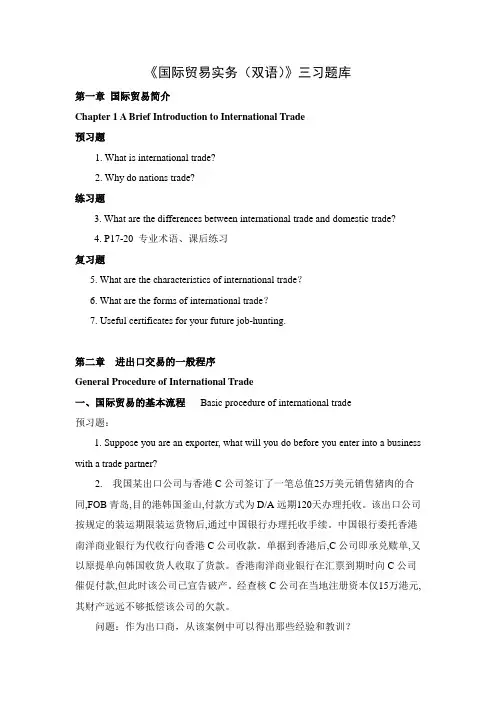
《国际贸易实务(双语)》三习题库第一章国际贸易简介Chapter 1 A Brief Introduction to International Trade预习题1. What is international trade?2. Why do nations trade?练习题3. What are the differences between international trade and domestic trade?4. P17-20 专业术语、课后练习复习题5. What are the characteristics of international trade?6. What are the forms of international trade?7. Useful certificates for your future job-hunting.第二章进出口交易的一般程序General Procedure of International Trade一、国际贸易的基本流程Basic procedure of international trade预习题:1. Suppose you are an exporter, what will you do before you enter into a business with a trade partner?2.我国某出口公司与香港C公司签订了一笔总值25万美元销售猪肉的合同,FOB青岛,目的港韩国釜山,付款方式为D/A远期120天办理托收。
该出口公司按规定的装运期限装运货物后,通过中国银行办理托收手续。
中国银行委托香港南洋商业银行为代收行向香港C公司收款。
单据到香港后,C公司即承兑赎单,又以原提单向韩国收货人收取了货款。
香港南洋商业银行在汇票到期时向C公司催促付款,但此时该公司已宣告破产。
经查核C公司在当地注册资本仅15万港元,其财产远远不够抵偿该公司的欠款。
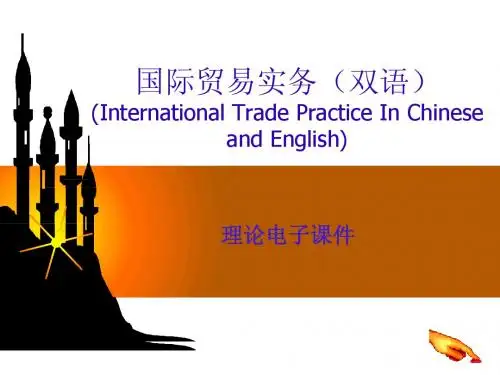
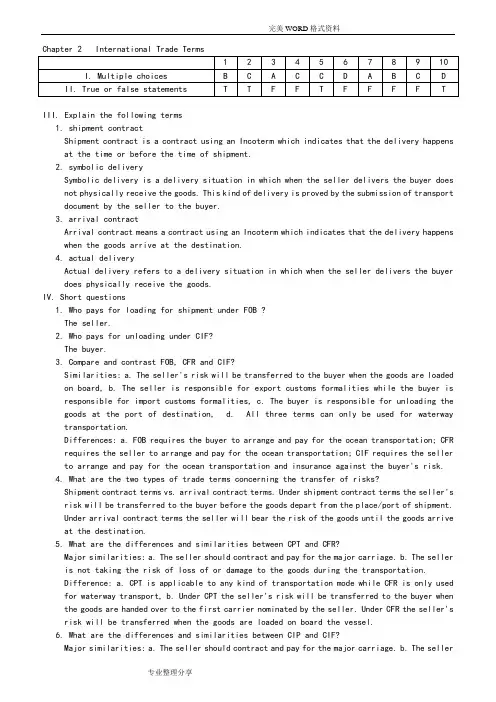
III. Explain the following terms1. shipment contractShipment contract is a contract using an Incoterm which indicates that the delivery happens at the time or before the time of shipment.2. symbolic deliverySymbolic delivery is a delivery situation in which when the seller delivers the buyer does not physically receive the goods. This kind of delivery is proved by the submission of transport document by the seller to the buyer.3. arrival contractArrival contract means a contract using an Incoterm which indicates that the delivery happens when the goods arrive at the destination.4. actual deliveryActual delivery refers to a delivery situation in which when the seller delivers the buyer does physically receive the goods.IV. Short questions1. Who pays for loading for shipment under FOB ?The seller.2. Who pays for unloading under CIF?The buyer.3. Compare and contrast FOB, CFR and CIF?Similarities: a. The seller's risk will be transferred to the buyer when the goods are loaded on board, b. The seller is responsible for export customs formalities while the buyer is responsible for import customs formalities, c. The buyer is responsible for unloading the goods at the port of destination, d. All three terms can only be used for waterway transportation.Differences: a. FOB requires the buyer to arrange and pay for the ocean transportation; CFR requires the seller to arrange and pay for the ocean transportation; CIF requires the seller to arrange and pay for the ocean transportation and insurance against the buyer's risk.4. What are the two types of trade terms concerning the transfer of risks?Shipment contract terms vs. arrival contract terms. Under shipment contract terms the seller's risk will be transferred to the buyer before the goods depart from the place/port of shipment.Under arrival contract terms the seller will bear the risk of the goods until the goods arrive at the destination.5. What are the differences and similarities between CPT and CFR?Major similarities: a. The seller should contract and pay for the major carriage. b. The seller is not taking the risk of loss of or damage to the goods during the transportation.Difference: a. CPT is applicable to any kind of transportation mode while CFR is only used for waterway transport, b. Under CPT the seller's risk will be transferred to the buyer when the goods are handed over to the first carrier nominated by the seller. Under CFR the seller's risk will be transferred when the goods are loaded on board the vessel.6. What are the differences and similarities between CIP and CIF?Major similarities: a. The seller should contract and pay for the major carriage. b. The selleris not taking the risk of loss of or damage to the goods during the transportation, c. The seller must obtain insurance against the buyer's risk.Difference: a. CPT is applicable to any kind of transportation mode while CFR is only used for seaway or inland waterway transport, b. Under CPT the seller's risk will be transferred to the buyer when the goods are handed over to the first carrier nominated by the seller.Under CFR the seller's risk will be transferred when the goods are loaded on board the vessel.7. If you trade with an American, is the sales contract subject to Incoterms without any doubt?What should you do?No. The Revised American Foreign Trade Definitions 1941 is still in use, especially in the North American area. It has different interpretation about some trade terms. The traders should clarify the choice of rules before any further discussion.8. What are the most commonly used trade terms?FOB, CFR & CIF.9. Who is responsible for carrying out customs formalities for exports under an FOB contract?The seller. According to Incoterms 2010, except EXW and DDP these two terms, all the other eleven terms require the seller to handle the export customs formalities, while the buyer the import customs formalities.10. If a Chinese trader signs an FOB Hamburg contract, is he exporting or importing?Importing. FOB should be used with a "named port of shipment", if Hamburg is the port of shipment, from the Chinese trader's perspective, he is importing.V. Case studies1. An FOB contract stipulated "The shipment will be effected in March 2011." When the goodswere ready on 10 March 201 l, the seller contacted the buyer for shipment details. The buyer faxed "Please send the goods to the port for loading on 21 March. The vessel will depart on22 March." The seller sent the goods to the port accordingly. However the nominated vesseldid not turn up and the goods had to be stored in the warehouse at the port. On the night of 21 March a fire happened in the warehouse area and part of the goods was damaged. When the vessel arrived two days later the seller and the buyer had an argument about the settlement of the loss. The seller required the buyer to bear the loss caused by the fire, but the buyer believed that the vessel arrived within the shipment period and the loss occurred before the seller delivered the goods therefore the seller should bear the loss. Please provide your solution.析:1)首先案例中提到货物发生了损失是由于货物存放在码头仓库期间发生火灾造成的。
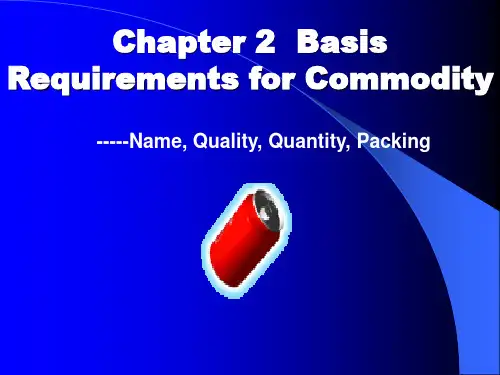

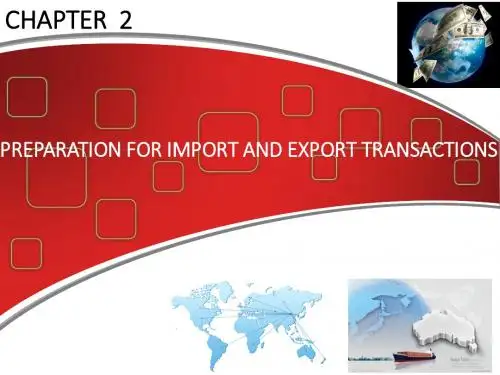

国际贸易实务教案Chapter 1 Brief Introduction to International Trade国际贸易简介1.1 Reasons for international trade1.1.1Resources Reasons(1) Natural resources.(2) Favorable climate conditions and terrain.(3) Skilled workers and capital resources.(4) Favorable geographic location and transportation costs.1.1.2Economic Reasons(1) Comparative advantage(2) Strong domestic demand(3) Innovation or style1.1.3Political Reasons1.2 Problems Concerning International Trade1.2.1Cultural Problems(1) Language.(2) Customs and manners.1.2.2Monetary Conversions1.2.3Trade BarriersIndividual countries put controls on trade for the following three reasons:(1) To correct a balance-of-payments deficit.(2) For reasons of national security.(3) To protect their own industries against the competition of foreign goods.Although tariffs have been lowered substantially by international agreements, countries continue to use other devices to limit imports or to increase exports. Some of these are:(1) requiring import licenses that permit only specific volumes or values imports;(2) setting quotas that limit the total value or volume of a product to be imported;(3) limiting government purchases to firms within the country;(4) applying standards for safety, consumer protection, or other reasons, which foreign products may not be able to meet;(5) making special payments called export subsidies to encourage local exporters to increase foreign sales;(6) targeting——a new term meaning the imposition of a package of measures to give certain local industries a competitive advantage in export markets. It might include export subsidies, technical assistance, subsidies for research and development, and financial assistance;(7) requiring licenses to obtain foreign currencies by those who want to buy goods from abroad——thus limiting the quantity of imports they can buy;(8) reducing the value of a nation’s currency in relation to that of the rest of the world so that its exported goods cost less in other countries and its imports cost more;(9) imposing conditions on foreign products such as requiring that their goods contain a certain amount of locally produced products;(10) restricting trade in banking, insurance, and other service professions.练习一:导论思考题:1国际贸易实务课程的主要任务和研究对象是什么?本课程包括哪些主要内容?2与国内贸易相比进出口贸易有何特点?3国际贸易中影响较大的惯例、条约有哪些?其主要内容是什么?有何特点?4根据我国合同法规定,合同应包括哪些主要内容?5进出口贸易一般要经过哪几个步骤?在进出口业务中,出口商/进口商的主要工作是什么?Chapter 5. Trade Terms and Export PricingPart I. Outline本章要点5.1 Trade Terms and International Trade Practices贸易术语与国际贸易惯例5.2 13 Trade Terms in INCOTERMS 2000《2000通则》中的13中贸易术语5.3 Selection of Trade Terms贸易术语的选用5.4 Export Pricing出口定价5.1Trade Terms and International Trade Practices贸易术语与国际贸易惯例5.1.1 国际货物买卖适用的法律与惯例1、交易双方当事人所在国的国内法2、国家对外缔结或参加的有关国际贸易、国际运输、商标、专利、仲裁等方面的条约和协定。
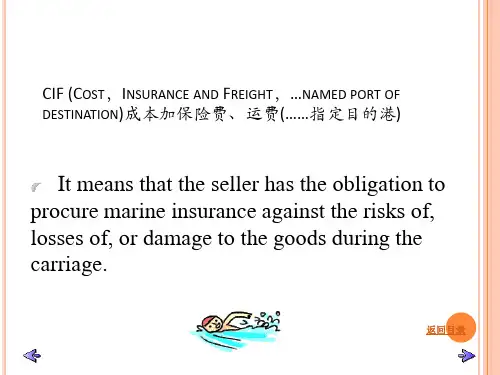


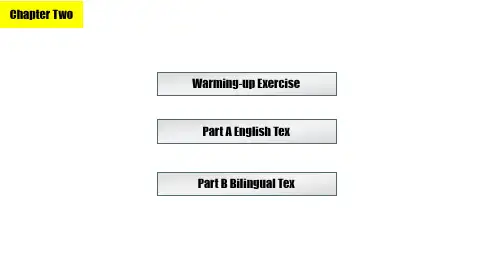
Chapter1I. Answer my questions1. International trade is business whose activities involve the crossing of nationalborders. It includes not only international trade and foreign manufacturing but alsoencompasses the growing services industry in areas such as transportation, tourism,banking, advertising, construction, retailing, wholesaling, and mass communications.It includes all business transactions that involve two or more countries. Such businessrelationship may be private or governmental.2. Sales expansion, resource acquisition and diversification of sales and supplies.3. To gain profit.4. To seej out foreign markets and procurement.5. There are four major forms which are the following:Merchandise exports and Imports, Service Exports and Imports, Investment andMultinational Enterprise.6. It is the account which is a summary statement of the flow of all internationaleconomic and financial transactions between one nation United States ) andthe rest of the world over some period of time, usually one year.7. Merchandise Exporting and Importing.8. Yes. There are great differences between them.1) direct investment takes place when control follows the investment. It usuallymeans high commitment of capital, personnel, and technology abroad. It aims atgaining of foreign resources and foreign markets. Direct investment may often gethigher foreign sales than exporting. And sometimes it involves two or more parties.2) While portfolio investments are not under control. And they are used primarilyfor financial purposes. Treasures of companies, for example, routinely more fundsfrom one country to another to get a higher yield on short term investments.9. MNE is the abbreviation of the multinational enterprise. Its synonyms are NNC(the multinational corporation) and TNC (transnational corporation). 10. Examples are travel, transport, fee, royalties, dividends and interest.11. The choice of forms is influenced by the objective being pursued and theenvironments in which the company must operate.12. It is limited by the number of people interested in a firm’s products andservices and by customers’ capacity to make purchase.13. This is because at an early stage of international involvement these operationsusually take the least commitment and leas t risk of a firm’s resources.14. Royalties means the payment for use of assets from abroad, such as fortrademarks patens, copyrights, or other expertise under contract known as licencingare also paid franchising.15. It is a way of doing business in which one party (the franchiser) the use of atrademark that is an essential asset for the franchisers’ business.II Match each one on the left with its correct meaning on the right 1. JIII Translate the following terms and phrases into Chinese1 购买力 11 经济复苏;恢复2 潜在销售量 12 经济衰退3 加价,涨价 13 间接投资4 国内市场 14 有形货物5 制成品 15 有形进出口6 边际利润 16 收入及支出;岁入及岁出7 市场占有率 17 超额能力8 贸易歧视 18 贸易中间人(商);经纪人9 时机选择 19 全部包建的工程承包方式10 经销周期 20 许可证协定IV Translate the following into English1. Trade is often the ‘engine’ of growth. However oversimplified this metaphormay be, it does serve to underline the importance of foreign trade in the process ofgrowth. A healthy expansion of exports may not always be sufficient condition forrapid and sustained growth, but a strong positive association between the two isclearly undeniable. Trade expansion contributes to economic growth in many ways.Among them are the benefits of specialization; the favorable effects of internationalcompetition on domestic economic efficiency; the increased capacity to pay for theimports required in development and more generally the stimulus to investment.2. International trade is the exchange of goods and services produced in onecountry for goods and services produced in another country. In addition to visibletrade, which involves the import and export of goods and merchandise, there is alsoinvisible trade, which involves the exchange of services between nations. Nationssuch as Greece and Norway have large maritime fleets and provide transportationservice. This is a kind of invisible trade. Invisible trade can be as important to somenations as the export of raw materials or commodities is to others. In both cases, thenations earn the money to buy necessities.3. There exist different ways of conducting international business. Exclusive salemeans the seller gives the overseas client the exclusive right of selling a particularproduct in a designated area within a specified period of time. In this kind of businesstransaction, the product is bought by the exclusive seller and therefore he should sellthe product by himself, assuming sole responsibilities for his profit and loss.Exclusive sale is different from agency where only commission is involved. Anddifference exists between general contract and exclusive sales because the exclusiveseller enjoys exclusive right in a particular area.4. There is no country in the world that can produce all the products it needs.Thus countries join in international division of labor for effective production andreproduction. Sometimes a country can buy goods and services from abroad on abarter basis. Barter means doing business by exchanging goods of one sort for goodsof another sort without using money. Barter trade itself is not enough to meat acountry’s impo rt needs. But as a form of international trade, it is still attractive indeveloping countries where foreign exchange is in short supply and inflow of foreignfunds is far from sufficient to meet their obligations in external trade.Chapter2I. Answer the following questions(Omited)II. Filling the blanks with the suitable words in the text: satisfying; , foreign/overseas; ; ; ;; ; ; , venture;the followings into English1). Economic activity began with the cavemen, who was economicallyself-sufficient. He did his own hunting, found his own shelter, and provided for hisown needs. As primitive populations grew and developed, the principle of division oflabor evolved. One person was more able to perform some activity than another, andtherefore each person concentrated on what he did best. While one hunted, anotherfished. The hunter then traded his surplus to the fisherman, and each benefited fromthe variety of diet.In today’s complex economic world, neither individuals nor nations are self-sufficient nations are self-sufficient. Nations have utilized different economicresources; people have developed different skills. This is the foundation ofinternational trade and economic activities.Foreign trade, the exchange of goods between nations, takes place for many reasons. The first, as mentioned above, is that no nation has all of the commoditiesthan it needs. Raw materials are scattered around the world. Large deposits of copperare mined in Peru and Zaire, diamonds are mined in South Africa, and petroleum isrecovered in Middle East. Countries that do not have these resources within their ownboundaries must buy from countries that export them.Foreign trade also occurs because a country often does not have enoughof aparticular item to meet its needs. Although the United States is a major producer ofsugar, it consumes more than it can produce internally and thus must import sugar.Third, one nation can sell some items at a lower cost than other countries. Japanhas been able to export large quantities of radios and television sets because it canproduce them more efficiently than other countries. It is cheaper for the United Statesto buy these from Japan than to produce them domestically.Finally, foreign trade takes place because of innovation or style. Even though theUnited States produces more automobiles than any other country, it still imports largequantities of autos from Germany, Japan and Sweden, primarily because there is amarket for them in the United States.2). The different kinds of trade nations engaged in are varied and complex, amixture of visible and invisible trade. Most nations are more dependent on exportsthan on any other activity. The earnings from exports pay for the imports that theyneed and want. A nation’s balance of p ayment is a record of these complex transactions. By reflecting all of these transactions in monetary terms , a nation is ableto combine the income it receives, for example, from exports, tourists expenditures,and immigrant remittances. This combined incomes is then spent on such items asmanufactured goods from other countries, travel for its citizens to other countries, andthe hiring of construction engineers.Chapter3I. Translate the followings from Chinese into English:1 terms of payment2 written form of contract3 execution of the contract4 sales contract5 purchase confirmation6 terms of transaction7 trading partners 8 the setting up of a contract9 trade agreement 10 consignment contract11 the contract proper 12 extension of the contract13 the contracting parties 14 special clause15 general terms and conditionsII. Answer the following questions in English:1 A contract is an agreement which sets forth bind obligations of the relevantparties. And any part that fails to fulfill his contractual obligations may be sued andforced to make compensation.2 There are two parties of business contract negotiations: oral and written. Theformer refers to direct discussions abroad; written negotiations often begin withenquiries made by the buyers.3 A written contract is generally prepared and signed as the proof of the agreementand as the basis for its execution. A sales or purchase confirmation is less detailedthan a contract, covering only the essential terms of the transaction. It is usually usedfor smaller deals or between familiar trade partners.4 The setting up of a contract is similar to that of a trade agreement or any othertype of formal agreements. It generally contains: 1) the title. The type of the contractis indicated in the title; 2) the contract proper. It is the main part of a contract; 3) thesignature of the contracting parties indicating their status as the seller or the buyer; 4)the stipulations on the back of the contract and are equally binding upon thecontracting parties.5 It generally contains the time of shipment, the mode of payment described inaddition to an exact description of the goods including the quantity, quality,specifications, packing methods, insurance, commodity inspection, claims, arbitrationand force majeure, etc.III. Translate the following into Chinese:合同是在双方达成协议的基础上制定的,而协议又是双方进行商务谈判的结果。